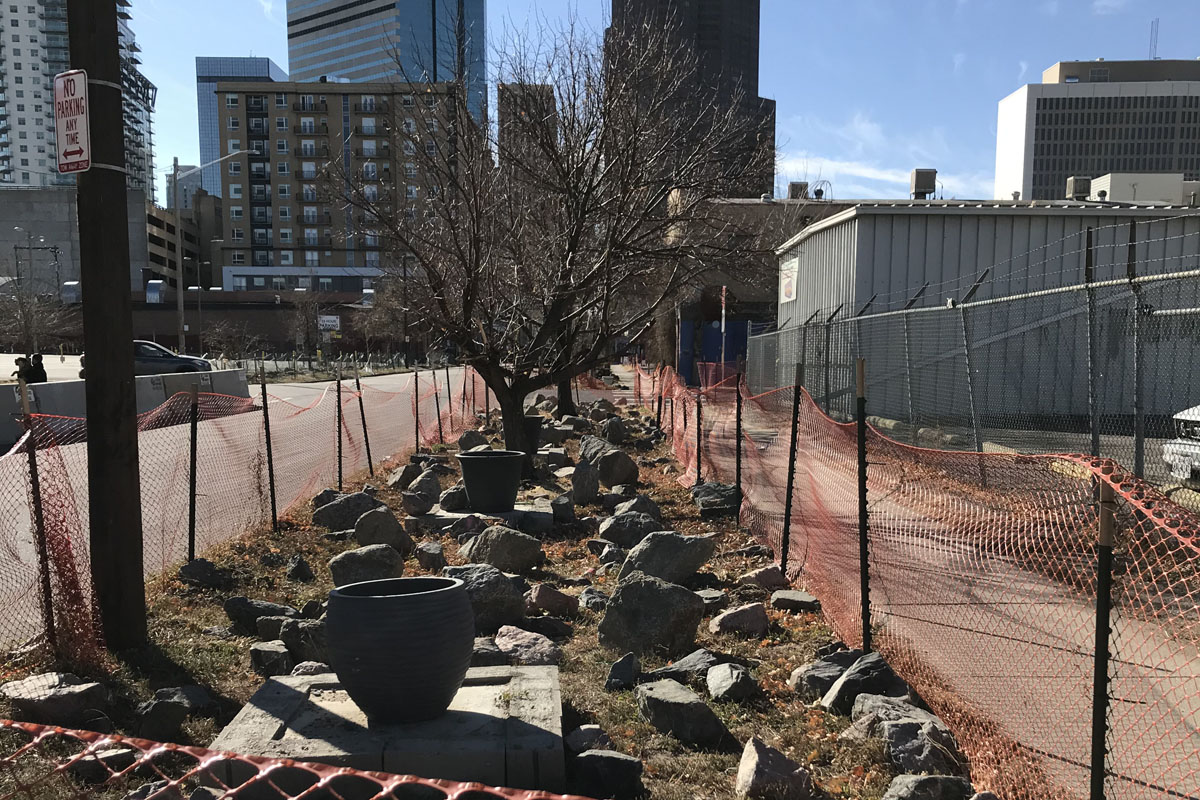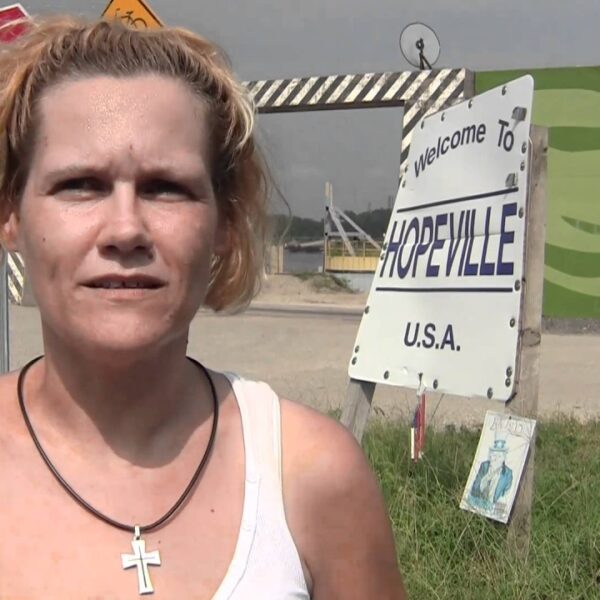Use of Large Jagged Boulders May Violate the CDC’s Eviction Moratorium
Sky, 32, has been cleaning her tent since morning. She’s rolled the sleeping bags and swept the floor. She even sanitized some things with bottle of hand sanitizer she got at a local food bank. Living near Coors Field makes it tough to keep a clean house, she said. The area is usually busy. The cars traveling down 21st Street toward Market Street seem to hurl everything from the road onto the sidewalk.
For the last four months, she’s also watched Denver plant little “rock gardens” on the sidewalks around her shelter. They’re temporary gates with large, jagged rocks collected inside. She said xeriscaping like this isn’t necessarily her style. Each one sits where a homeless camp once stood.
“I think they look so stupid,” Sky told Invisible People. “They could be spending a little of that money on providing us housing instead.”

Denver began using this kind of xeriscaping in January after disbanding a camp outside a condominium complex in Five Points.
Some residents appreciated the city clearing tents from the property. Others described the use of the rocks as “very unwelcoming.”
In its defense, Denver said it wants to bring all homeless people inside for the winter. Then local service providers and social workers can match individuals with programs. However, its practice of fencing-off or disturbing the grounds of cleared homeless camps violates both the Center for Disease Control’s eviction moratorium, and several constitutional rights of the city’s homeless people, according to a lawsuit filed by Denver’s homeless people in October.
The lawsuit alleges Denver’s xeriscaping and no-notice sweeps violate a settlement it struck with homeless plaintiffs in 2019. One tenet of the settlement requires Denver to notify homeless people and service providers at least seven days before clearing a camp. For public health reasons, the city must also state its case to the Homeless Advisory Committee. This group is comprised of former homeless people and community members that advise the city on housing issues.
Denver’s homeless people say the city regularly ignores this tenet. It has continuously cleared camps and displaced thousands of homeless people since April.
The lawsuit also seeks to tie Denver to the CDC’s eviction moratorium because the homeless camps often stake ground on city and state property. The moratorium also said cities should not sweep homeless camps unless there is enough shelter beds to accommodate them.
During the pandemic, Denver lost over 50% of its shelter bed space to implement social distancing, according to a report by the Denver Department of Housing Stability. In response, the city has rented over 1,300 hotel rooms for homeless people and is currently building over 1,500 affordable housing units.
Denver cited both of these reasons in a court filing last week where it argued that continuing to clear camps and fence off public property is in line with the CDC’s order.
“The CDC recognized that while clearing encampments or moving people along with no plan for where those people will go is not ideal; those options need to be considered when encampments are unsafe or unsanitary,” the motion states.
Most of Denver’s sweeps are conducted under the banner of public health. At each location, an order is taped to a nearby light pole or zip-tied onto one of the temporary fences saying the areas are “undergoing a cleaning.”
Denver swept the Lincoln Park encampment at the state capitol building in June after discovering trench fever, a disease that hasn’t been prevalent since World War 1.
And while it remains to be seen whether Denver can continue to treat homeless people this way, the rocks and fences serve as a reminder that the prospects of sleeping on the street are growing thinner. Eventually, Denver hopes the scarcity of space will force homeless people into shelters.
However, a growing consensus of Denver’s homeless population sees the shelters as untrustworthy and unreliable.
There are reports of theft among homeless residents. Staff turns down beds, even when a resident needs to see a doctor. Shelters also commonly turn away families, children, and people with pets. They are also infamously violent places for women and Trans women.
To address this issue, Denver is opening a Temporary Safe Outdoor Space (SOS) for up to 30 women and Trans women in the parking lot of a church in Capitol Hill. The space is planned to be open for six months. It will provide services from job matching to commercial and personal laundry. Mobile showers, restrooms and medical care is also available for residents.
However, several neighborhoods have objected to the plan. Pete Coors said the plan is “appalling” and another example of Denver “finding ways around our wishes and laws by establishing homeless encampments on private property in our neighborhood.”
While these debates rage on, Denver’s homeless people await a resolution. Near Sky’s home in Ballpark, fences stand near a day labor agency and the St. Francis Center, a local service provider. She said she camped on the street’s shady side in hopes of being able to stay in place longer.
“You know, where are we supposed to go, really?” Sky said. “Instead of looking like they’re trying to solve the problem, Denver is telling us we are not welcome here anymore.”













